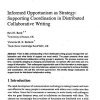Free Online Productivity Tools
i2Speak
i2Symbol
i2OCR
iTex2Img
iWeb2Print
iWeb2Shot
i2Type
iPdf2Split
iPdf2Merge
i2Bopomofo
i2Arabic
i2Style
i2Image
i2PDF
iLatex2Rtf
Sci2ools
ECSCW
1993
1993
Informed Opportunism as Strategy: Supporting Coordination in Distributed Collaborative Writing
Abstract: There is little understanding of how distributed writing groups manage their collaboration and what kinds of support are most useful. The paper presents three case studies of distributed collaborative writing groups in academia. The process evolves over time, constantly adapting to changing circumstances. Co-authors offer and make use of a range of information. Their subsequent opportunistic use of this information to make appropriate ad hoc decisions in new circumstances, appears to be essential to achieve flexibility and coordination. We call this informed opportunism. We identify design implications for support tools for distributed collaborative writing.
| Added | 02 Nov 2010 |
| Updated | 02 Nov 2010 |
| Type | Conference |
| Year | 1993 |
| Where | ECSCW |
| Authors | Eevi Beck, Victoria Bellotti |
Comments (0)

